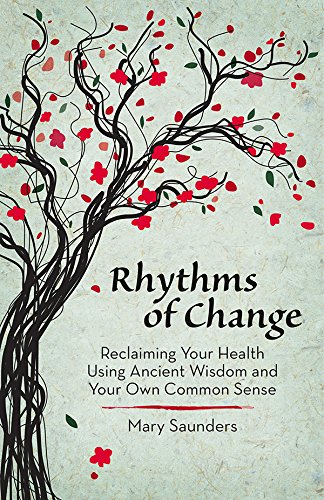I am incredibly lucky. And I feel humbled and grateful for that fortuitousness, for being blessed with work that I love. Every day I go to the office and help women find themselves. I’m not saying that I do the finding. I simply shine the light. And often what they find shimmering in that space is fearsome in its power. I see women in the process of becoming.
You see, my practice is devoted to helping women find balance. Hormonal balance, emotional balance, the balance between work and rest, between self and family. Often what brings women through my doors is that they are off kilter. The teeter-totter has swung too far in one direction and they are either dangling in mid-air or stuck on the ground, unsure of how to proceed.
When I reflect on who these women are, I find a pattern emerging. Each and every one of them—in this state of imbalance—is a woman on the verge of deep, inner change. They are the adolescent women, struggling with PMS; the women moving into motherhood, seeking hormonal support for fertility challenges; new mothers whose bodies have become vessels for birth and sustenance; and aging women who are neither new mothers nor menopausal, but somewhere in between, grappling with their changing hormones and the milieu of physical and emotional symptoms that accompany that transitional time period.
These women are all on the precipice of leaving what is known and moving into the waiting arms of the void. They are in the process of becoming the maiden or changing from maiden to mother, from mother to crone. They are on the verge of utter transformation as they embrace new rhythms in their bodies and newly defined roles for living and being in the world.

When women find themselves at this precipice, it can cause deep unrest, inner turmoil, and maybe even the occasional desire to run screaming out of her own skin. But why is a transformation so painful for us? I believe it is because, as women, we are inherently rhythmic creatures and any disruption to our internal rhythms can feel like seismic activity on a grand scale. We spend the large majority of our lives in a rhythmic coming and going of hormones. After adolescence, we become a living cycle, at one with the moon, always in a state of waxing or waning, that becomes our very state of existence. It is not even that we identify with our rhythms—we become them. And so when they are in this state of transformation, the balance is lost and it leaves us feeling unsure of who we are and where we fit within our own bodies. It can leave us feeling as though we inhabit an alien body, our internal compass is broken and spinning wildly out of control.
Add to this that we are already out of balance with our human rhythms: we no longer rise and sleep with the sun, nor do we follow the dictates of the seasons as our predecessors did. We are a world of do-ers and workers and the very pace of our existence has sped up exponentially in an alarmingly short period of time. Our world is fast, fast, fast and we are in a constant battle to keep up. But it is more than our bodies were designed to do and our inner rhythms simply cannot keep pace. We have forgotten how to BE. And this skews our ability to come into a new way of being.
What is there to do?
Chinese medicine can help, as restoring internal balance is the very premise of our practice. Acupuncture and Chinese herbs are a valuable resource throughout a woman’s life, helping with countless maladies from the common cold to digestive upset. But during times of transition, Chinese medicine is an indispensible ally, smoothing the edges and bringing a renewed sense of structure to one’s changing hormones and emotions. I can personally attest to its power during my own feminine transitions, both as I struggled with fertility and during my transition into menopause. Each time, I found that regular treatment with acupuncture and herbs brought an inner shift that I did not experience with other health modalities.
But equally, if not more, important is the need to honor one’s own rhythms and reach for balance. Sensing that resting point on one’s own teeter-totter is key; and when you find yourself flailing or falling, seek within yourself for what will bring balance to that moment. Ask yourself the following questions (and be willing to hear the answers):
- Are you tired? If so, how can you bring more rest to your life? I strongly recommend being to bed by 10:30 pm at the latest, as many hormonal functions occur during sleep and begin after 11 pm.
- Are you overextended or working too many hours? If so, what would prioritizing your time look like? Consider scheduling time in your day that is just for you or time spent with your children or spouse. When you look back on your life, those will be the moments that count, not the hours spent glued to your computer monitor or hunched over financial reports.
- Are you depressed or apathetic? If so, how can foster joy in this moment? One exercise is to practice gratitude. List 10 things you are grateful for right now and say “Thank You” after each one.
- Are you anxious or scattered? If so, how can you tap into your inner well of calm? The breath is an excellent way to get in the here and now. Music is also nice. I like to combine the two, listening to calming music while also watching my breath—this helps me breathe more deeply (it should extend your diaphragm, not your chest), which always helps me let go of anxious, fearful, or worrisome thoughts.
To tap deeply into your human rhythms, I highly recommend the book, Rhythms of Change. It is concisely written, poignant in its message, and relevant to our busy lives. The author helps us learn practical ways of regulating our own internal rhythms in accord with those of nature so that we can come back to an aligned sense of self. It is powerful in its simplicity and is a modern-day must-read. I love this book! 
Finally, in the midst of a busy, work-centered, “yang” world, be willing to acknowledge your “yin” feminine self, along with the waxing and waning of your own rhythms. Embracing the coming and going of your own tides will help you leap through life’s transitions occur more gracefully.
~Kandace Cahill, DAOM, L.Ac., FABORM



